This past week, I put my eggs all in one basket!
For some odd reason, it seemed like lots of people I follow on social media were trying an “egg fast”. I am so keen on switching things up all the time – so I figured “why not?!?” Also, although I’m at a healthy weight, I’m very interested in moving my body fat percentage down still. Maybe this egg fast thingy would help that?
Another reason is the fact that I haven’t been able to shake the three extra pounds since I’ve returned from Ireland. I mean, what gives? Oh yeah, my cortisol is sky high – but that’s for another post. So maybe the egg fast would allow me to drop them permanently?
I scoured the interwebs for ideas on how to do this egg fast. After reading quite a few experiences, I decided to do the following for three days because that’s how many I had before a social engagement on Friday (most people do three to five days):
- 2 eggs per meal time – up to three meals per day
- 1 tablespoon of healthy fat for EACH egg (butter, avo mayo, bacon grease)
- 1 ounce of cheese for EACH egg (love my cheese!)
- Eat every three hours and don’t go any longer than five hours between meals
- Hydrate well
- Continue my normal electrolyte balancing (pink salt, my magnesium supplement)
- 1 egg with 1 tablespoon fat as a snack IF NEEDED (and despite eggs being satiating, I did need a snack two of the three days)
I have always considered eggs to be an ideal food for my Keto lifestyle. High in fat, perfect in protein. By the time I cook them in some fat (bacon drippings or grass fed butter) or added some Avocado Mayo for an egg salad, I have a pretty good keto ratio.
Or so I thought.
Here’s my Keto macronutrient ratios for the three days:
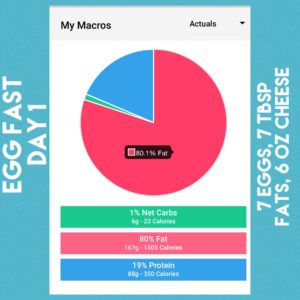
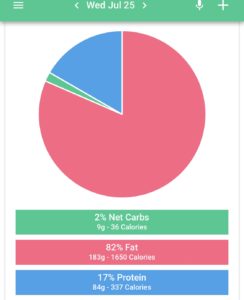
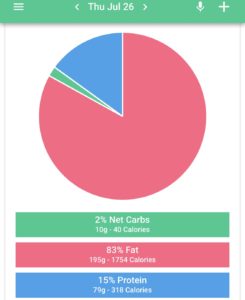
I ate way more fat than I probably ever have on this keto journey. I ate WAY more calories than I ever do on a daily basis. I was not HANGRY at any time, however, I did eat when I was hungry. Plus, I was adhering to all the advice that you have to eat the eggs! And the fat. And I wanted my cheese! I followed my parameters exactly for the three days.
This was my result on my Aria scale – which also measures body fat percentage:
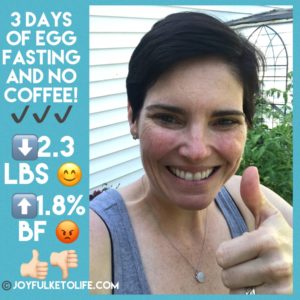
My weight went down, but my body fat percentage went way up! Definitely NOT what I was looking to achieve. In fact, it ticked me off. My overall thoughts on my egg fast: FAIL. I stuck with the routine for the full three days. I’m pretty positive I won’t be doing an egg fast again anytime soon.
Because I like experimenting with and hacking my diet, I thought I would share these results with you. I do believe that an egg fast could be very beneficial to anyone that is trying to bust a weight loss plateau on the scale. I often tell friends that are “stuck” to “eat fat to lose fat” and to “not fear the fat”. Don’t be afraid to experiment with Keto or LCHF options to see what works for your goals.
Ohh, additionally and just because I wouldn’t be having any heavy whipping cream for those three days – I decided to also give up COFFEE for three days! CRAZY, I know! But I did it! I didn’t have coffee for three whole days and I didn’t pass out cold. I’m really most pleased with myself for achieving that goal.
Now I’m two days past the egg fast. I went back to my normal, strict Keto routine with 18:6 Intermittent Fasting. My weight is back up 1.4 lbs but my body fat percentage is creeping back down .7%, so far. Sigh. But the good news – my jeans all still fit comfy. That’s really all I should be concerned about. Maybe someday I’ll write about “ditching the scale”. It’s a struggle.
Have you tried an egg fast? What were your results? Does this sound like an experiment you would try? Share your story!
(Disclaimer: I am not a health care professional. I am writing about my personal experiences to encourage others to research a low-carb lifestyle. You should always work closely with a health care professional to manage your health. I work with three MDs to manage my health: functional medicine, cardiology, and sleep/pulmonology. They treat my metabolic dysfunctions along with monitoring my important blood markers routinely. Keto or LCHF may not be an appropriate way of eating for your metabolic health or other health needs. Please check with your personal health care professional before making any changes in your diet.)
I’ve created a free resource for you with my favorite five tips for your weight loss success. Grab it here:
5 Tips to Jumpstart Your Health and Wellness Journey
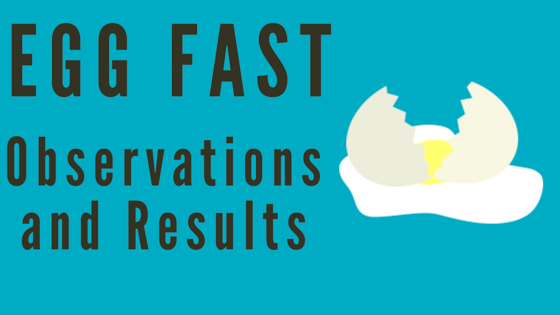

Hahaha! I love your blogs! You are so funny! I was considering an egg fast but not so much now after reading this! I get frustrated because I want the weight to just fall off but consistency is key. Thank you for posting!
Hi Jessica!
Nice to hear from you and thank you for your kind and funny comments 😛
Stay tuned for my next hacking adventure. I just broke up with Heavy Whipping Cream and I’m trying my best to up my protein to 30%, reduce fat to 65%, and keep carbs at 5% or less. If this doesn’t move these vacation pounds – I might scream 🙂
Hope you’re having a wonderful, joyful day!
Christine
I’ve found that the Aria scales and other BF% scales can be way off and really misleading. I have been able to get full medical grade scans (kind of like a Dexa scan, but I forget the name of the machine) at my keto-friendly cardiologist 3 times now, and my actual BF%s were substantially lower on the real scales than on my friend’s Aria scale which I had become somewhat obsessed with. I think going by the waist of your pants is a much better indicator! Thank you for sharing your results!
What’s the rationale for not having longer breaks between meals on an egg fast, I wonder?
Hi Maura!
Yes! I’ve had a Dexa scan and it was a few % points off my Aria. I have another one scheduled for the end of August. That will be more reassuring. I do not trust the exact reading on the scale, but I do look for the trends up and down. And I hop on it and off it if the reading is strange. LOL.
Taking measurements tomorrow as it’s the first of the month. I’m trying another hack to shake things up. Stay tuned – I’ll post about it!
I was wondering the same thing – I usually don’t eat if I’m not hungry! RIGHT?!?
Hope you are well and trekking along on your journey!
Christine
Hi, I just finished day 3 of my first egg fast experiment and the scale hasn’t moved an ounce in either direction! I noticed also when I plugged into carb Manager for macros that it was way over in fats and calories and not high enough in protein. I keep reading that calories don’t matter, minimum of 6 eggs, MANDATORY tbsp of fat per and I just don’t get it. I feel like I’ve stuck to the rules pretty well. About 7 eggs ea day and… nothing. Could it be because I’ve been on my period? Everyone else seems to have had so much success with this! Can’t wait to eat a steak and some veggies! Just gotta get back to strictly tracking macros I suppose if I want to bust my plateau.
Hi Julia! Oh most definitely it is probably what you mentioned about your cycle. I never lost any weight the weeks that I was on my period.
Pay attention to the downward trend of your weight loss on the three weeks you are not on your cycle.
This gives me a good idea for a blog post, so thank you!
Keep experimenting and do what feels “good” for you!
Blessings and JOY,
Christine